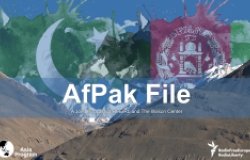What's Next for the Haqqani Network?
Earlier this month, the Taliban announced that Jalaluddin Haqqani, the founder, and leader of the feared Haqqani Network terror group, had died.
The Haqqani Network is a militant outfit fighting against the Afghan state and the US-led forces that support it. It is a particularly potent faction of the Afghan Taliban.
Jalaluddin Haqqani was once a leader of the mujahideen fighters targeting the Soviets in Afghanistan in the 1980s, before eventually turning his attention to the US-led NATO forces that entered the country in 2001. Today, Washington regards the Haqqani Network as one of the greatest militant threats in the country where it has fought a 17-year war.
In this first edition of the AfPak File, a new podcast series jointly hosted by Radio Free Europe/Radio Liberty and the Woodrow Wilson Center, a group of experts discusses what impact Haqqani’s death may have on the Haqqani Network and on the war in Afghanistan; what we know about the Haqqani Network’s numbers and location; what role it plays in the insurgency in Afghanistan; what its relationship is with Pakistan; how it may figure in a potential peace process in Afghanistan; and how it affects the US-Pakistan relationship.
The guests were Sahar Khan, visiting research fellow at the Cato Institute; Daud Khattak, reporter and editor with Radio Free Europe/Radio Liberty’s Radio Maashal; Michael Kugelman, senior associate for South Asia at the Wilson Center; and Haroun Mir, a founder of the Center for Research and Policy Studies in Kabul. The podcast was moderated by Mohammad Tahir, media manager for Radio Free Europe/Radio Liberty.
This podcast was originally posted at Radio Free Europe/Radio Liberty.
Moderator
Muhammad Tahir

Indo-Pacific Program
The Indo-Pacific Program promotes policy debate and intellectual discussions on US interests in the Asia-Pacific as well as political, economic, security, and social issues relating to the world’s most populous and economically dynamic region. Read more



